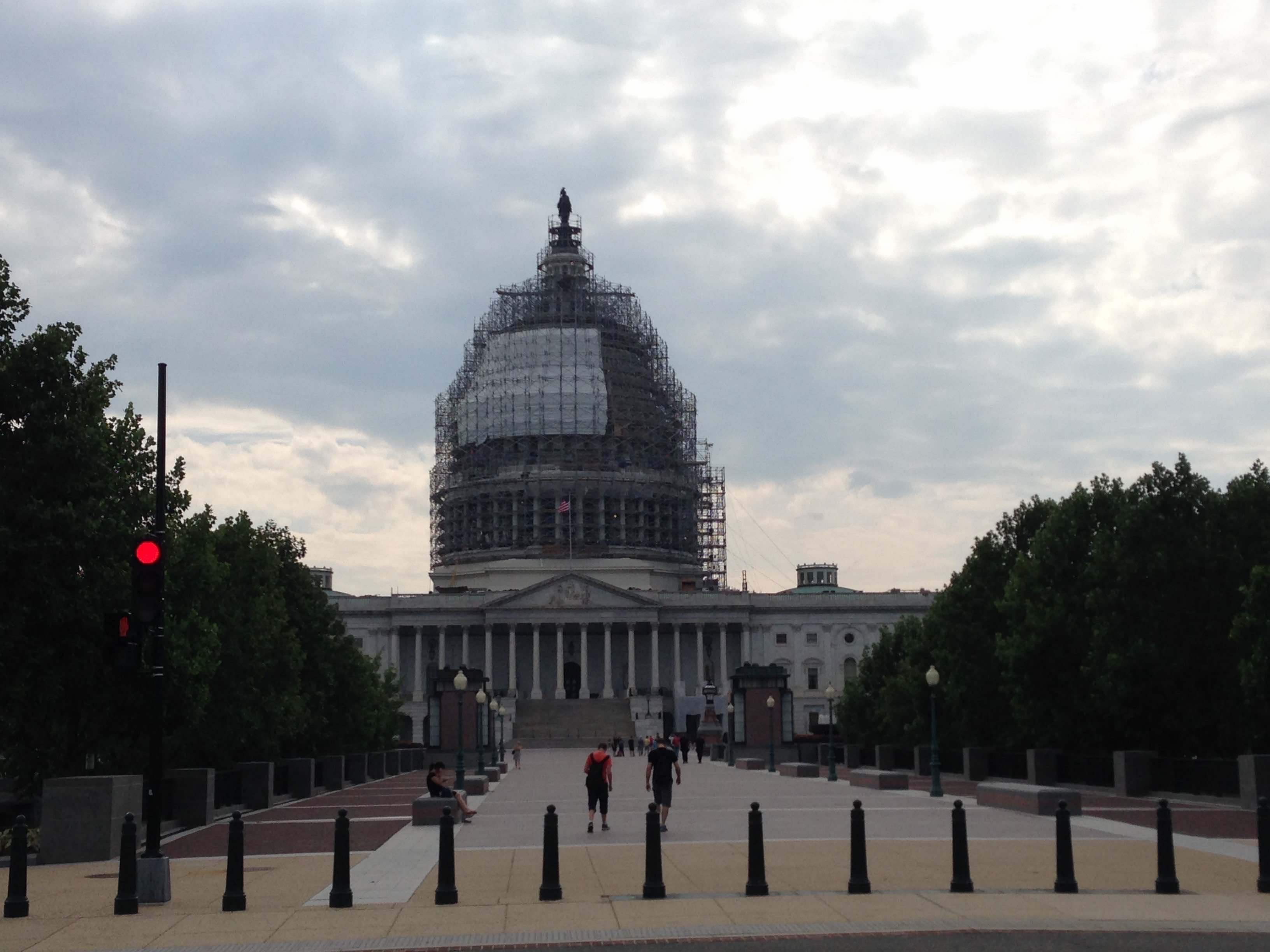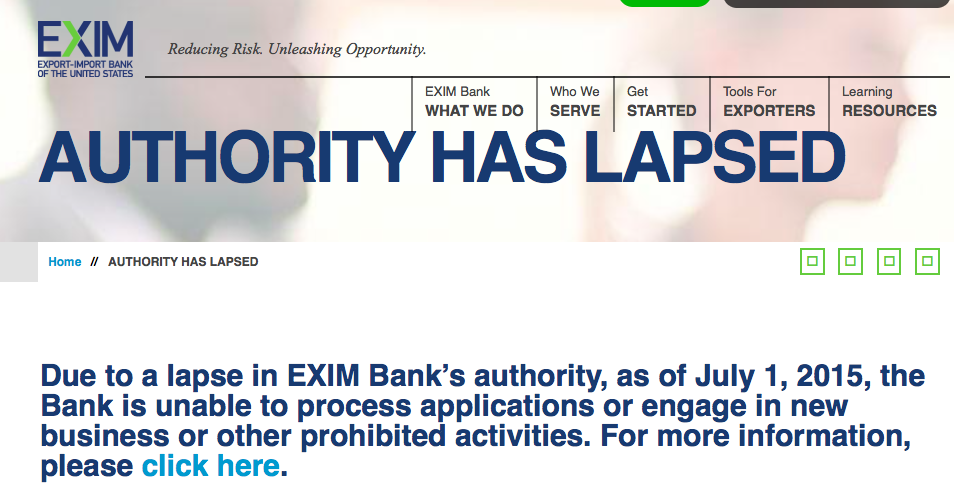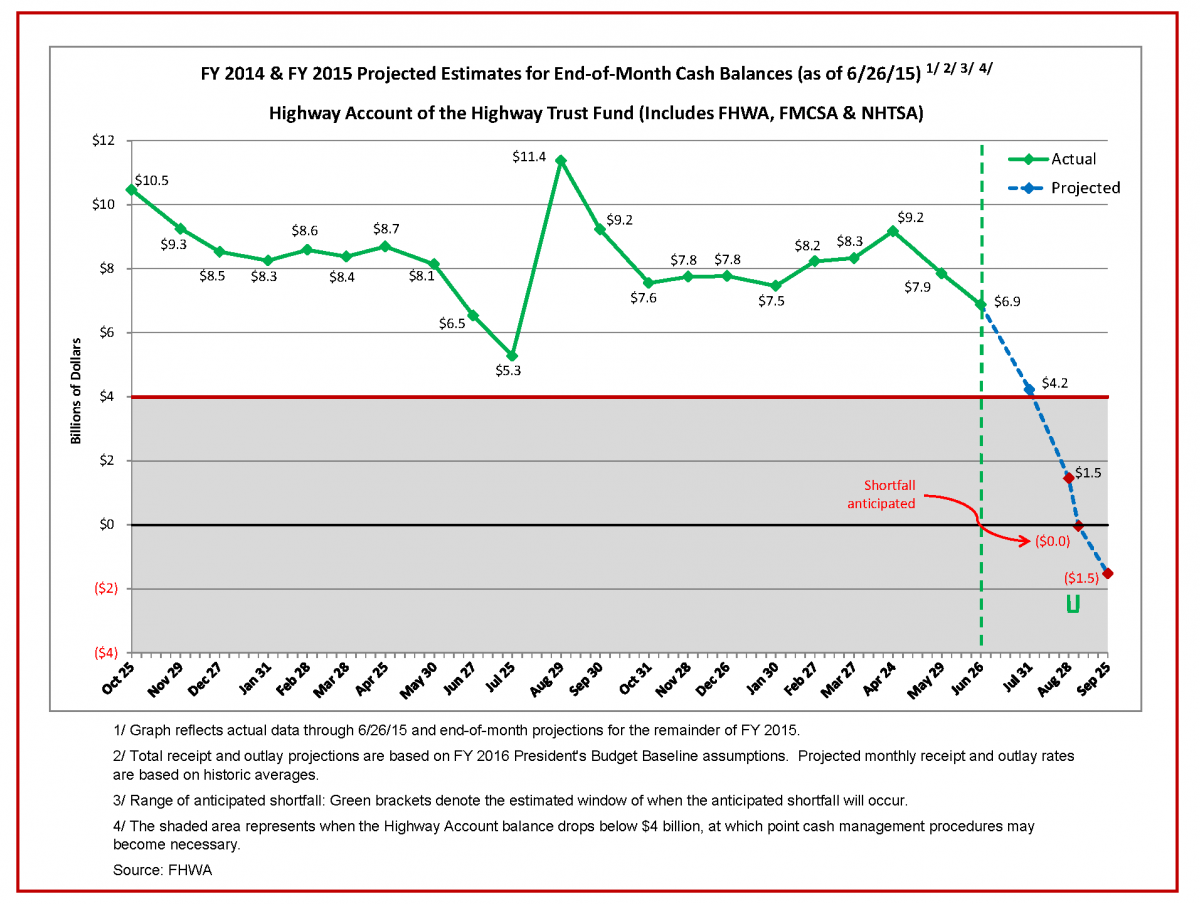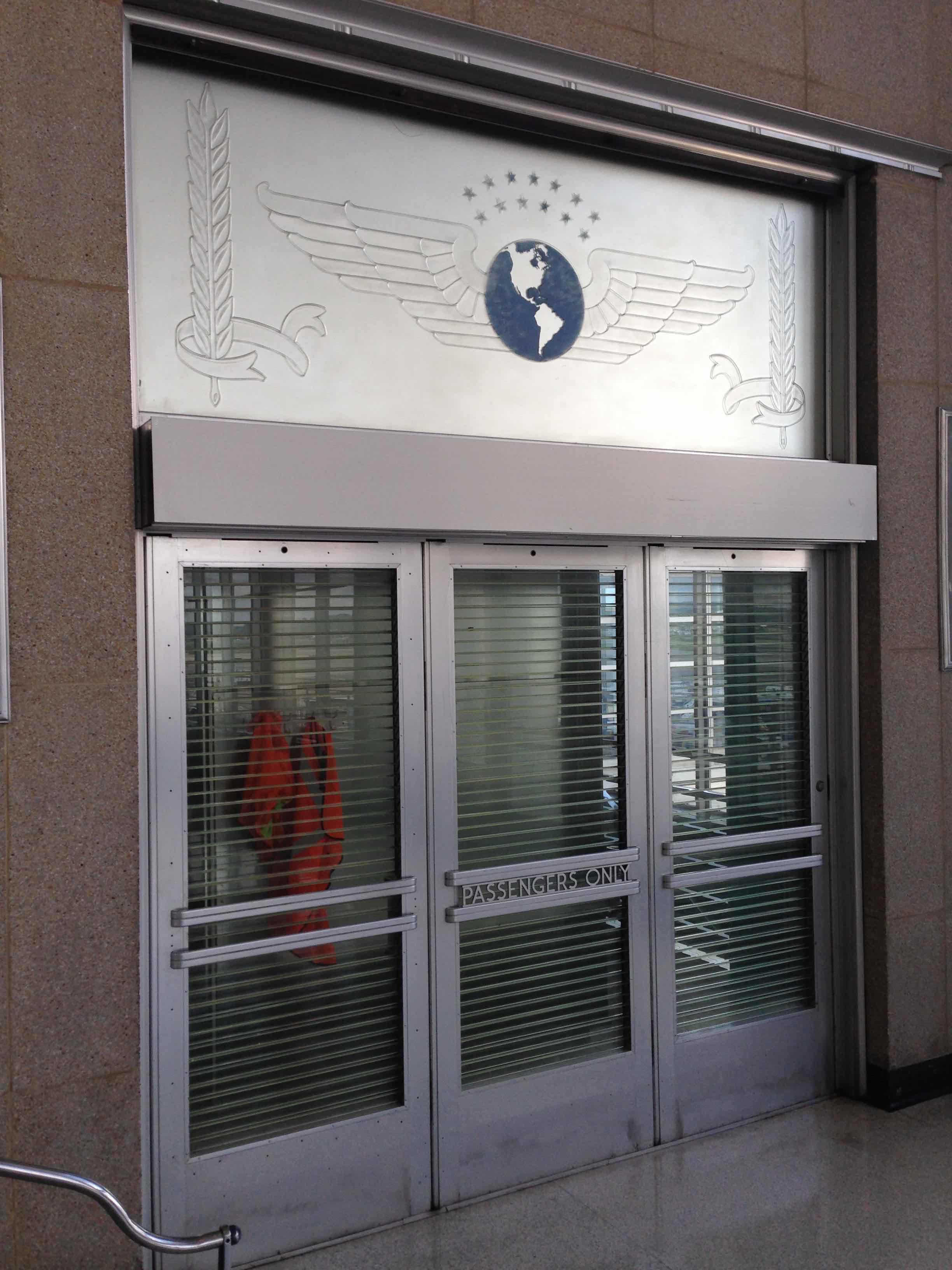
From our Hill Sources: This week starts early for the Senate—and it's going to be a busy one since August recess is quickly approaching! The Senate will be in session on Sunday to consider two amendments on controversial issues—reauthorizing the Export-Import Bank and repealing Obamacare—as part of their work on a highway funding bill. The Senate is also “fast-tracking” a bill which would eliminate federal funding of Planned Parenthood.
The House will be consider a wide range of legislation, including aviation security following a TSA report; homeland security; and VA accountability. In addition, they’ll work on reforms to the Secret Service following a series of scandals and a bill to address sexual assault in the military. The House will also vote on two bills related to how federal agencies create regulations.
The Senate in Session on Sunday
On Friday, the Senate voted to consider highway funding. (As we reported last week, with the Highway Trust Fund authorization set to expire on July 31 and both the Highway Account and the Mass Transit Account nearing insolvency, the House passed an extension through December 18.) After Senators voted to consider the highway funding bill, Senate Majority Leader Mitch McConnell (R-KY) set up votes for Sunday on two controversial issues: a repeal of the Affordable Care Act, known as Obamacare, and a reauthorization of the US Export-Import Bank.
Senator McConnell presented this plan as a compromise to pass the highway funding bill:
“First, it allows a vote on an amendment to reauthorize the Ex-Im Bank — something nearly every Democrat wants. Second, it allows a vote on an amendment that would repeal Obamacare—something nearly every Republican wants, and something we will continue to fight for.”
(Watch Senate floor proceedings via webcast.)
Amendment Reauthorizing the Ex-Im Bank

The Export-Import Bank’s charter expired on July 1—for the first time in its 81-year history. While the bank cannot currently make new loans, it continues to service outstanding loans and guarantees. However, its funding runs out at the end of FY 2015, Sept. 30, without Congressional action.
From our Hill Sources: While Senate Majority Leader Mitch McConnell (R-KY) has said repeatedly he personally opposes reauthorizing the Export-Import Bank, many in the Senate believe this vote is a part of a deal he struck. Sen. Maria Cantwell (D-WA) agreed not to bring up the Bank during the trade authority debate a few months earlier in exchange for a later vote.
The amendment the Senate will be voting on to reauthorize the Ex-Im Bank is identical to a bill that was introduced in March:
Export-Import Bank Reform and Reauthorization Act (S 819)
Sponsor: Sen. Mark Kirk (R-IL) —Bipartisan— Would reauthorize the Bank’s charter until September 30, 2019 and implement several reforms, including: Reduce risk to taxpayers by requiring higher loan loss reserves; Put greater focus on small businesses by increasing the required lending to small businesses from 20 percent to 25 percent; and increase oversight of Ex-Im Bank practices by: Creating a Chief Risk Officer and a Risk Management Committee to oversee the Bank's operations; Requiring the Inspector General to regularly audit the Bank’s risk management procedures; and Creating a non-political Chief Ethics Officer to oversee ethics practices of Bank employees. (Source: bill sponsors)
(Photo: Screen shot of www.exim.gov)
Amendment to Repeal Obamacare
While some in the Senate believe that there isn’t enough support to pass an Obamacare repeal, some Republicans are considering a unique strategy. A “non-germane” amendment—such as this Obamacare repeal to the highway funding bill—usually requires 60 votes to proceed. However, Senator Mike Lee (R-UT) plans to challenge the presiding officer of the Senate’s ruling on the matter, which takes 51 votes. After that, a non-germane amendment only needs 51 votes. According to Senator Mike Lee (R-UT):
“The first Obamacare vote on Sunday will have a 60 vote threshold, and Democrats will likely block it. But thanks to the sequencing of the votes we just locked in, Republicans will have the opportunity resurrect that Obamacare amendment later on in the process, and put it back before the Senate in a manner that only requires a simple-majority vote.”
From our Hill Sources: The House previously passed HR 596, a repeal of the Affordable Care Act, in February by a 239 – 186 vote along partisan lines. Even if the Senate passes a similar appeal, we can expect President Obama to veto it.
Highway Trust Fund Extension

The Senate will use HR 22, the Hire More Heroes Act, as the revenue shell, or vehicle, for their highway legislative package. “The bill authorizes federal surface transportation programs for six years, with three years of funding identified. The bill requires $47.143 billion in offsets to keep the Highway Trust Fund solvent for three years. Funding for the final three years of the bill will be available only if new legislation is enacted providing the necessary offsets. The authorization would apply to highways, highway safety, motor carrier safety, transit, and other programs funded out of the HTF,” according to the Senate Republican Policy Committee. Through the amendment process, the Senate added several related pieces of legislation to the bill, including the EPW DRIVE Act (S 1647), the Comprehensive Transportation and Consumer Protection Act (S 1732) and the Railroad Reform, Enhancement, and Efficiency Act (S 1626).
The House passed an extension of the highway funding bill last week. The Senate could instead pass this bill in order to avoid reauthorizing the Export-Import Bank:
Highway and Transportation Funding Act, Part II (HR 3038) – Passed by the House —
Sponsor: Rep. Paul Ryan (R-WI)—Bipartisan— Extends the authorizations of the federal surface transportation programs as well as the hazardous materials transportation program and the Dingell-Johnson Sport Fish Restoration Act through Dec. 18, 2015. Funds the surface transportation programs at the level authorized for fiscal year 2014. Would transfer $6.068 billion from the General Fund to the HTF’s Highway Account, and would transfer $2 billion from the General Fund to the HTF’s Mass Transit Account. (Read bill summary.) – Passed by the House; now goes to the Senate for consideration. —
Defunding Planned Parenthood
Senate Majority Leader Mitch McConnell has said he will “fast track” legislation to eliminate federal funding of Planned Parenthood. Some Republican Senators were pushing to include this proposal as an amendment to the Senate highway funding bill. A stand-alone bill was then introduced by Senator Rand Paul (R-KY):
Prohibiting federal funding of Planned Parenthood (S 1861)
Sponsor: Sen. Rand Paul (R-KY) “Would eliminate nearly $500 million of taxpayer funding each year to Planned Parenthood,” according to the bill sponsor. (Read bill text)
From our Hill Sources: Members of Congress are feeling a sense of urgency to vote on a bill prohibiting federal funding of Planned Parenthood after media reports of a video describing in detail Planned Parenthood’s role in the harvesting of fetal tissue. Senator Chuck Grassley (R-IA), Chairman of the Senate Judiciary Committee, is making inquiries to Planned Parenthood and the US Attorney General. (Read the letters.)
A similar bill has been introduced in the House:
Defund Planned Parenthood Act (HR 3134)
Sponsor: Rep. Diane Black (R-TN) “Would place an immediate moratorium on all federal funding of Planned Parenthood for the span of one year while Congress conducts a full investigation into the organization’s activities,” according to the bill sponsor. (Read bill text)
Airport Security

Last month, the Department of Homeland Security (DHS) Inspector General (IG) released a report analyzing aviation security and the TSA in particular. According to the report, the “TSA had less effective controls in place for ensuring that aviation workers 1) had not committed crimes that would disqualify them from having unescorted access to secure airports areas, and 2) had lawful status and were authorized to work in the United States. In general, TSA relied on airport operators to perform criminal history and work authorization checks, but had limited oversight over these commercial entities. Thus, TSA lacked assurance that it properly vetted all credential applicants.” (Read the full DHS Report)
This week, the House will consider a series of bills related to aviation workers and TSA accountability:
Improved Security Vetting for Aviation Workers Act (HR 2750)
Sponsor: Rep. John Katko (R-NY) —Bipartisan— “Mandates coordination between the Secretary of Homeland Security, the Interagency Policy Committee, and the Administrator of TSA to determine the best practices to expand the vetting process for aviation workers. This would include enhancing the process for vetting aviation workers against the Terrorist Identities DataMart Environment (TIDE) database. The bill also provides a timeline for the TSA Administrator to issue guidance strengthening credentialing requirements for aviation workers,” according to the bill sponsor.
Keeping Our Travelers Safe and Secure Act (HR 2770)
Sponsor: Rep. Kathleen Rice (D-NY) —Bipartisan— “Requires the TSA Administrator to develop and implement a preventive maintenance process for airport screening technology within 180 days. The process must include specific maintenance schedules, guidance for TSA personnel and contractors on how to conduct and document maintenance actions, mechanisms to insure compliance, and penalties for noncompliance,” according to the bill sponsor.
TSA PreCheck Expansion Act (HR 2843)
Sponsor: Rep. John Katko (R-NY) “Directs the TSA to expand and promote enrollment in its PreCheck program by partnering with the private sector,” according to the bill sponsors.
Securing Expedited Screening Act (HR 2127)
Sponsor: Rep. Bennie Thompson (D-MS) —Bipartisan— “Directs TSA to make expedited screening available only to individuals who are vetted participants in the PreCheck program and other known or vetted passengers. Under H.R. 2127, in addition to PreCheck participants, passengers enrolled in Global Entry or other DHS trusted traveler programs would get such screening, as well as passengers in certain age groups, military servicemembers, and other populations identified by TSA as known and low risk. The legislation will also ensure that if TSA wants to provide expedited screening to passengers outside these groups, TSA could do so by an alternate method only if it is validated as a secure vetting method in an independent assessment submitted to Congress. Importantly, the bill requires TSA to maintain the availability of expedited screening at or above the current level, even as it refines the population that is eligible for such screening,” according to the bill sponsors.
(Photo of Ronald Reagan National Airport Old Terminal.)
Homeland Security
The House will also vote on several bills related to Homeland Security:
First Responder Anthrax Preparedness Act (HR 1300)
Sponsor: Rep. Peter King (R-NY) —Bipartisan— “Directs the Secretary of Homeland Security to make anthrax vaccines and antimicrobials available to emergency response providers,” according to the House Homeland Security Committee.
State Wide Interoperable Communications Enhancement Act (HR 2206)
Sponsor: Rep. Donald Payne (D-NJ) —Bipartisan— “Requires recipients of State Homeland Security Grant Program funding to preserve and strengthen interoperable emergency communications capabilities,” according to the House Homeland Security Committee.
Border Security Technology Accountability Act (HR 1634)
Sponsor: Rep. Martha McSally (R-AZ) “Requires that Department of Homeland Security border security technology programs to: Implement an Acquisition Program Baseline before moving to the next phase of the acquisition lifecycle; Adhere to internal control standards identified by the Comptroller General of the United States; and Develop a plan for testing and evaluation, as well as use independent verification and validation resources for border security technology,” according to the House Homeland Security Committee.
Preclearance Authorization Act (HR 998)
Sponsor: Rep. Patrick Meehan (R-PA) “Allows the Secretary of Homeland Security to establish preclearance operations in a foreign country to prevent terrorists, instruments of terrorism, security threats and other and inadmissible persons from entering the United States. Requires the Secretary to notify Congress days before entering into an agreement with a foreign government to establish a preclearance operation. Directs the Secretary to certify the homeland security benefits of the preclearance operation and that at least one United States passenger carrier operates at that location. Requires the aviation security screening standers at a preclearance location be comparable to that required in by the Transportation Security Administration. Requires any foreign county where a preclearance operation agreement is to be established or renewed to routinely submit information to INTERPOL’s Stolen and Lost Travel Document database and make that information available to the US government,” according to the bill sponsors.
Policymaking and Regulations
The House will consider two bills, which would influence how federal agencies create regulations:
Evidence-Based Policymaking Commission Act (HR 1831)
Sponsor: Rep. Paul Ryan (R-WI) “Would establish a 15-member commission to study how best to expand the use of data to evaluate the effectiveness of federal programs and tax expenditures. The commission would also study how best to protect the privacy rights of people who interact with federal agencies and ensure confidentiality. Specifically, the commission would determine whether the federal government should establish a clearinghouse for program and survey data, which qualified researchers from both the private and public sector could access and use to perform program evaluations and policy-relevant research. By coordinating data across federal programs and tax expenditures, and giving researchers greater access to that data, federal agencies would gain a better grasp of how effective they are, and lawmakers would gain a better grasp of how to improve them,” according to the bill sponsors.
Regulations from the Executive in Need of Scrutiny (REINS) Act (HR 427)
Sponsor: Rep. Todd Young (R-IN) “Would require any executive branch rule or regulation with an annual economic impact of $100 million or more—designated by the White House’s Office of Management and Budget (OMB) as a “major rule”—to come before Congress for an up-or-down vote before being enacted,” according to the bill sponsor. “In 2014, the executive branch finalized 3,541 new rules and regulations—approximately 16 times greater than the 223 new laws passed by Congress and signed by President. Of those rules and regulations, 200 were deemed to be ‘major’.”
Secret Service Reform
The House will vote on a bill that would make changes to the Secret Service. According to the bipartisan sponsors of the bill, “over the past few years, a series of scandals and failures have rocked the Secret Service, ranging from the agents’ use of prostitutes while on official presidential travel to Colombia, to the agency’s failure to initially apprehend a fence-jumper who later was arrested deep into the White House residence, to the most recent incident where two agents allegedly drove while intoxicated into an active bomb investigation outside of the White House.”
Secret Service Improvements Act (HR 1656)
Sponsor: Rep. Bob Goodlatte (R-VA) —Bipartisan— “Provides much needed resources to the Secret Service that enhance agents’ training, strengthen security at the White House, and improve transparency and accountability at the agency. This legislation also requires Senate confirmation of the Director of the Secret Service. It defies logic that the person we entrust to not just protect the President, but to also head a $1.5 billion federal law enforcement agency, is not subject to the same process of advice and consent as his counterparts at other comparable agencies. Collectively, these resources and changes will help reform the Secret Service and restore it as a sterling law enforcement agency,” according to the bill sponsors.
Veterans Issues and Sexual Assault in the Military
Ruth Moore Act (HR 1607)
Sponsor: Rep. Chellie Pingree (D-ME) —Bipartisan— “Since the vast majority of sexual assaults in the military go unreported, and even those that are reported are often not prosecuted, many survivors of military sexual trauma have found it hard to prove that an assault—the stressor—occurred. The Ruth Moore Act allows a statement from the survivor ("lay testimony") to be considered sufficient proof that the assault occurred. Current VA policy allows so-called "secondary markers" to be considered as evidence of an assault, although the VA has been very inconsistent in applying that policy. Secondary markers can include evidence from rape kits, statements from family members citing a change in behavior since military service and drug and alcohol abuse,” according to the bill sponsors.
Veterans’ Compensation Cost-of-Living Adjustment Act (HR 675)
Sponsor: Rep. Ralph Abraham (R-LA) —Bipartisan— “Would authorize the Secretary of the VA to provide an automatic annual increase to the rates of veterans’ disability compensation, compensation for dependents, clothing allowance, and compensation for surviving spouses and children based on the Consumer Price Index Urban Wage Earners and Clerical Workers (CPI-W)” beginning Dec. 1 next year, according to the bill sponsors.
VA Accountability Act (HR 1994)
Sponsor: Rep. Jeff Miller (R-FL) —Bipartisan— “Give the secretary the authority to remove any VA employee based on performance or misconduct. The employee would have the right to file an appeal with the Merit Systems Protection Board within seven days of their removal, and the MSPB would have to make a final decision on the removal within 45 days of the appeal submission. Legislation providing the Secretary authority to remove VA senior executive service employees in a similar manner sailed through Congress and was signed into law by the President last August. Limit the secretary’s authority to remove or demote an employee if they are a whistleblower who has filed a claim with the Office of Special Counsel,” according to the House Veterans Affairs Committee.
Also in the House…
The House will also vote on the following bills this week:
Need-Based Educational Aid Act (S 1482)
Sponsor: Sen. Chuck Grassley (R-IA) —Bipartisan— “Allows colleges and universities that admit students on a need-blind basis to collaborate on the formula they use to determine how much families can pay for college. This exemption was first enacted in 1994, and has been reauthorized by Congress three times without opposition, most recently in 2008. In addition to collaborating on a common formula for calculating ability to pay for college, higher education institutions are permitted to agree to award aid only on the basis of financial need and use a common application for aid,” according to the bill sponsors. The current exemption expires in September. —Passed the Senate; now goes to the House for consideration.—
Sawtooth National Recreation Area and Jerry Peak Wilderness Additions Act (HR 1138)
Sponsor: Rep. Mike Simpson (R-ID) “Will establish certain wilderness areas in central Idaho and to authorize various land conveyances involving National Forest System land and Bureau of Land Management land in central Idaho,” according to the bill sponsor.
Illegal, Unreported, and Unregulated (IUU) Fishing Enforcement Act (HR 1138)
Sponsor: Del. Madeleine Bordallo (D-GU) —Bipartisan— “Would enhance the enforcement authority of the US Coast Guard and the National Oceanic and Atmospheric Administration (NOAA) to regulate and combat IUU fishing,” according to the bill sponsors. “Would strengthen existing enforcement measures by increasing the capacity for inspection, identification, and monitoring of illegal foreign vessels. The legislation would also amend several international agreements to incorporate civil and criminal penalties, and broaden data sharing authority with foreign governments in order to identify and penalize nations that do not comply with fisheries management regulations.”
Hire More Heroes Act (HJRes 61)
Sponsor: Rep. Rodney Davis (R-IL) To exempt employees with health coverage under TRICARE or the Veterans Administration from being taken into account for purposes of determining the employers to which the employer mandate applies under the Patient Protection and Affordable Care Act.
— Please keep in mind that highlighting a bill doesn't imply a POPVOX endorsement in any way. Rather, we're simply trying to offer one more way to stay informed of a complex legislative system. —